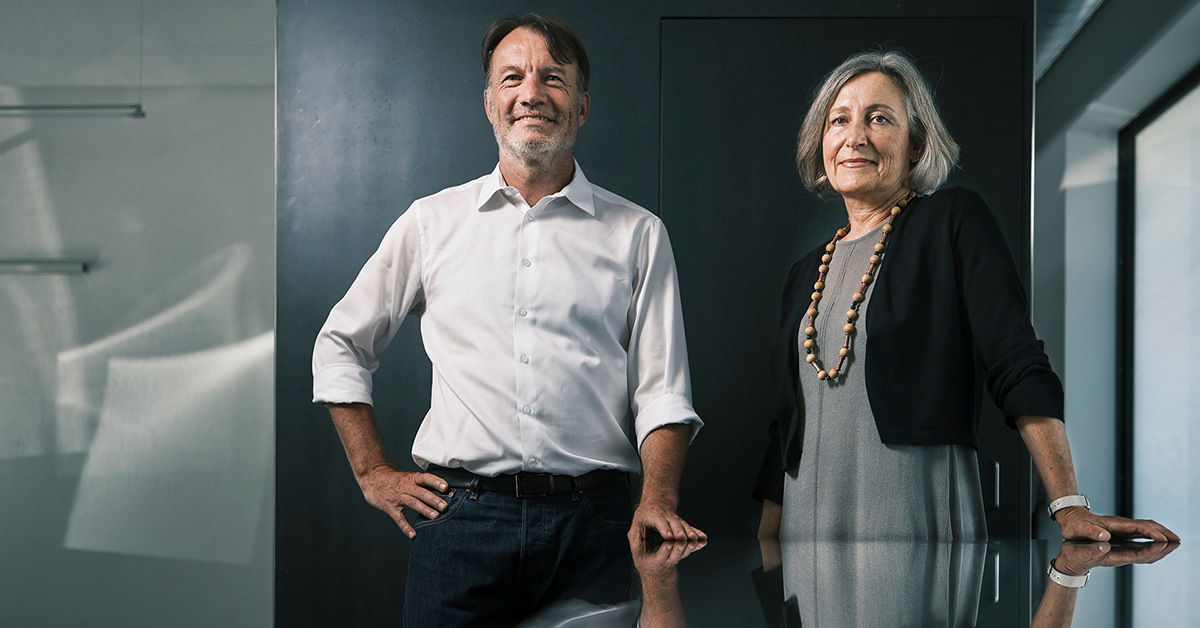UniBE talks
On the status of research collaborations with the USA
The new US research policies are also having a direct impact on researchers of the University of Bern. That became apparent at the event "UniBE talks" on the topic of “Research Collaborations with the USA”. Dialog with American colleagues remains important.
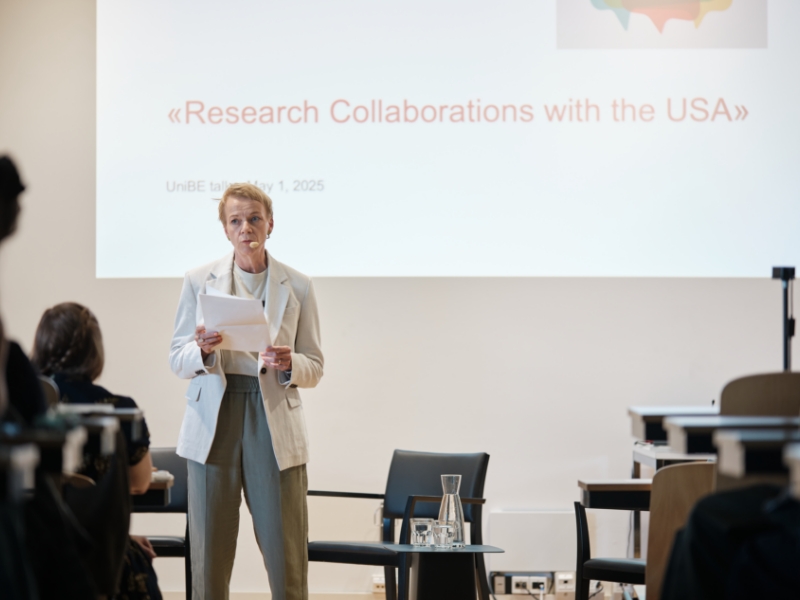
“UniBE talks” is the event format organized by the University of Bern that took place on May 1 in a well-attended Audimax. As Rector Virginia Richter explained in her introduction, these round table talks and discussions – which will be held once per semester in the future – are focused in part on community building. Standing together as a scientific community is now more important than ever because it’s only by working together and demonstrating solidarity that we can build up the resilience we need to tackle “uncertainties unlike anything the academic world has experienced in recent history”. With reference to the Trump administration’s agenda, Richter urged the disciplines to refrain from letting themselves be pitted against one another: “Theoretical physicists have to show solidarity with their colleagues from climate physics.”
Billions in budget cuts and reductions in staff
Attending via Zoom, Brendan Karch provided first-hand information about the confusing situation in the US at the start of the event. He is the Interim CEO of Swissnex in Boston, one of Switzerland’s outposts with the mission of networking with the international research and innovation landscape. Karch explained about the billions in budget cuts that had already been made or planned for the future and talked about job cuts at funding institutions such as the US National Science Foundation – all in all, a bleak picture.
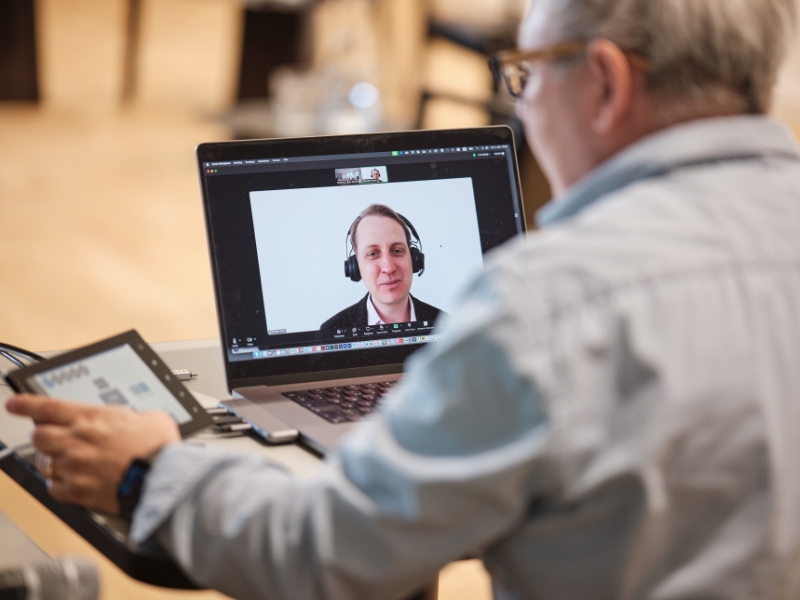
But Swissnex’s representative also allayed some concerns: With respect to the widely discussed visa and immigration problems, he was only aware of two cases involving Swiss researchers to date. And Brendan Karch was cautiously optimistic about the future: “Switzerland remains a strong partner to the USA.” His talks with research institutions and funding agencies have shown that partnerships with researchers from Switzerland are still in high demand.
An atmosphere of fear and bleak job prospects
The subsequent panel discussion was moderated by Claudia Franziska Brühwiler, an expert on America from the University of St. Gallen, and featured four researchers from the University of Bern reporting about their personal experiences with the new US research policies: political scientist Karin Ingold, evolutionary biologist Catherine Peichel, climate researcher Thomas Frölicher and healthcare scientist Per von Groote.
“When I saw my US colleagues, I was surprised by just how depressed they were.”
Karin Ingold
Karin Ingold, who is also the President of the Oeschger Centre for Climate Change Research at the University of Bern, told those present about a recent work-related trip to the University of Colorado. She was surprised to see just how depressed her colleagues were and shocked by the “atmosphere of fear”. Particularly distressing was the situation of doctoral students in climate and environmental sciences, who were extremely concerned about their professional future. Once she had returned to Bern, one of her US colleagues contacted her and asked whether there might be a job for her in Switzerland: “I talked to my family. We’re ready to emigrate.”
Measurement data for climate models at risk
All of the Bernese researchers gathered together on the podium have research projects that are partly funded by the US and each and every one of them has already found themselves faced with budget cuts.
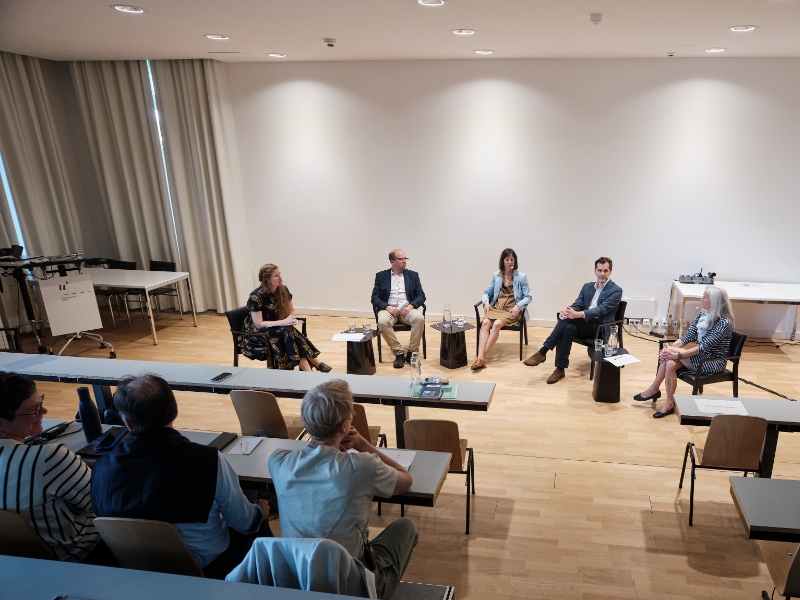
For Thomas Frölicher, however, the difficulties extend beyond the financial aspect. He works with ocean measurement data collected from inside the world’s oceans by a mobile observation system named Argo. Half of this international program’s funding comes from the US government. According to Frölicher, if only some of the 1,500 floating robotic instruments could not continue to be operated due to the elimination of US funds, this could result in “blind spots” in global data acquisition – with corresponding consequences on the forecasts prepared based on climate models.
While Frölicher is concerned about the future of the measurement data that both he and other Swiss researchers rely on, he is even more worried about the personal contacts that are in jeopardy. “I should have been meeting up with US colleagues at conferences in Europe in the near future. That won’t be possible anymore. None of them are allowed to travel.”
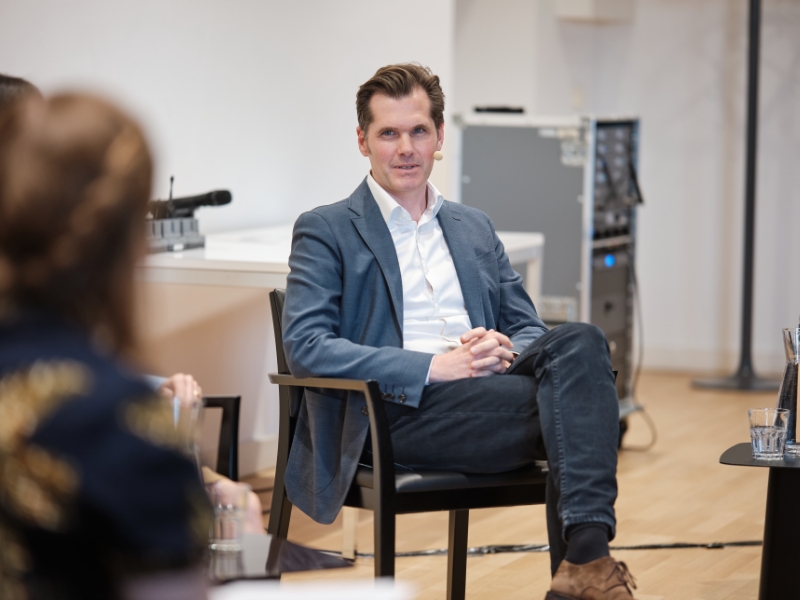
Sudden funding freeze hits AIDS research hard
At the University of Bern, the US budget cuts probably hit Per von Groote the hardest. He is the Program Manager of IeDEA, an international epidemiological database to evaluate the spread of AIDS in Africa. In collaboration with partners at the University of Cape Town, this team from Bern is researching how people carrying the HIV virus can lead a long and healthy life. Within the scope of this project, 14 employees in Bern were financed through funds from the US National Institute of Health. But at the start of this year, after 19 years, all that came to an end overnight. The reason: In the US, AIDS – much like the climate – is no longer an opportune field of research. “We realized something was wrong when we suddenly lost access to our US accounts while trying to make salary payments,” von Groote reported.
Should young researchers still apply for positions in the US?
What does the future of research collaboration hold in this uncertain environment? And: Should early career researchers even continue to apply for postdoc positions in the US? The panel discussion revealed that there are no clear answers to the questions currently weighing on the minds of many researchers in Bern. “It really depends on the field of research. I’d be extremely cautious in climate science,” said Brendan Karch of Swissnex. A research visit in the USA could still be a “very enriching experience” in other fields. However, you need to get a clear picture of what the financing situation is like in the research group you’d like to join.
“We should adopt a more global mindset and expand our networks to Asia and the Global South.”
Catherine Peichel
Surprisingly, it was Per von Groote – whose experience with the US budget cuts was particularly drastic – who expressed optimism during the discussions. While he recommended putting research projects on broader financial footing and keeping an eye out for alternative sources of funding, he also said, “We should definitely continue to invest in research collaborations with the US.”
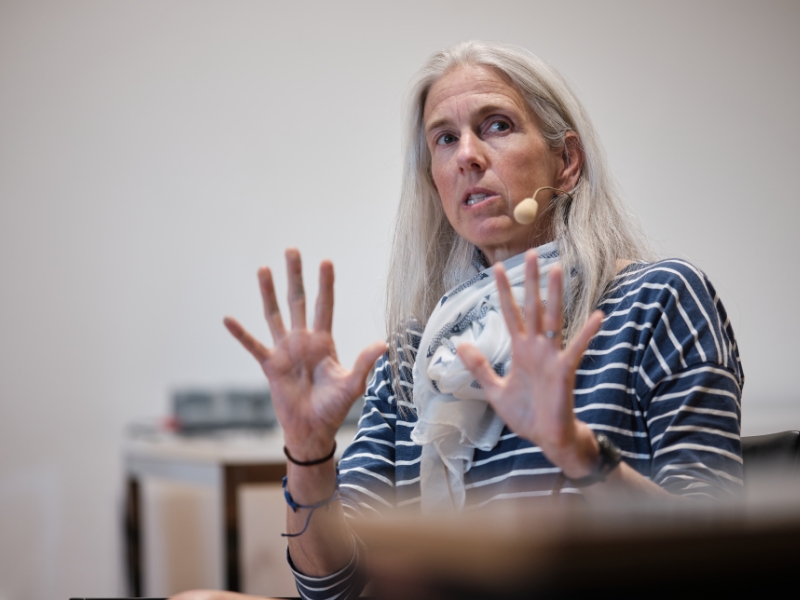
Rethinking research networks – global and broader
Catherine Peichel, herself a US citizen who came to the University of Bern in 2016, painted a more nuanced picture of the new realities: For one, she recommended abandoning the notion that the US is the center of the research world. “We should adopt a more global mindset and expand our networks to Asia and the Global South.” On the other hand, however, the evolutionary biologist warned against giving up long-standing partnerships. “I don’t want my US colleagues to get the feeling that they’ve been left in the lurch by the international research community.”
UniBE talks
“UniBE talks” is a series of events at the University of Bern that aims to foster dialog on a variety of topics relevant to academia. Each event seeks to reflect the broad diversity of disciplines and academic cultures at the University of Bern. Through “UniBE Talks”, the University of Bern aims to promote dialog between representatives of different academic fields.
Subscribe to the uniAKTUELL newsletter

Discover stories about the research at the University of Bern and the people behind it.
